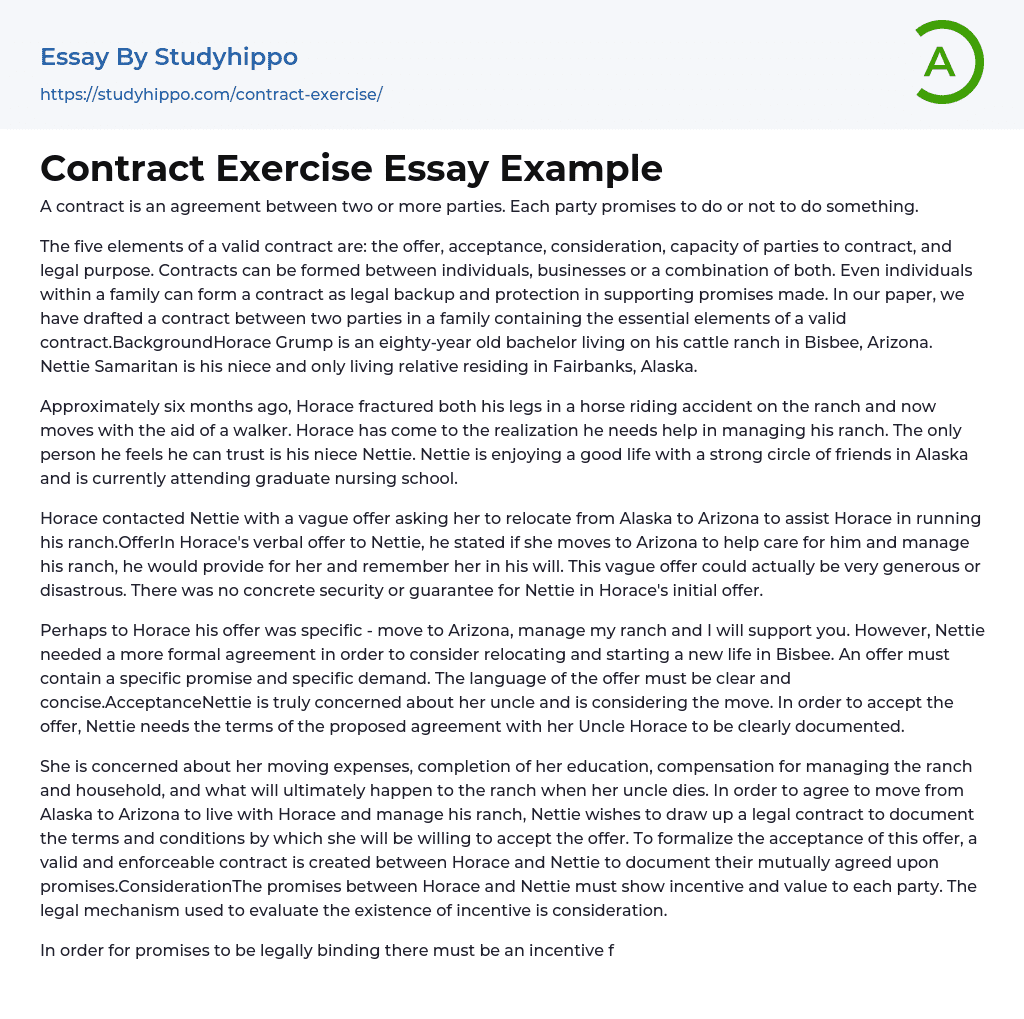Two or more parties come to an agreement through a contract where each pledges to either perform or abstain from certain actions.
The key components of a legally binding contract include the offer, acceptance, consideration, capacity of the involved parties, and a legal purpose. Such contracts may be formed among individuals, businesses or a mix of the two. Even family members can create a contract for mutual protection and to uphold promises made. Our paper presents a sample contract that we have developed between two family members, which incorporates all the basic elements of a valid contract. This specific agreement involves Horace Grump, an unmarried octogenarian who lives on his Bisbee, Arizona cattle ranch and his relative Nettie Samaritan who resides in Fairbanks, Alaska.
About half a year ago, Horace suffered a horseba
...ck riding injury that resulted in broken legs. As a result, he now uses a walker to move around. He has realized that he needs assistance in running his ranch and trusts his niece, Nettie, to provide it. Nettie is currently pursuing a graduate nursing degree in Alaska and has a supportive group of friends.
Horace made a vague offer to Nettie to relocate from Alaska to Arizona and help him manage his ranch. He promised to provide for her and include her in his will, but there was no clear security or guarantee for Nettie in the offer.
Uncle Horace offered to support Horace if he moved to Arizona and managed his ranch. However, Nettie requires a formal agreement that includes specific promises and demands in order to contemplate relocating to Bisbee. The offer language must be precise and unambiguous. Although Nettie is worried about
her uncle, she is considering the move. To accept the proposal, Nettie needs a written documentation of the terms of the agreement with her Uncle Horace.
Nettie is worried about various aspects including her moving expenses, completion of her education, compensation for managing the ranch and household, and the ultimate fate of the ranch when her uncle passes away. To accept Horace's proposal to manage his ranch in Arizona and move from Alaska, Nettie wants to establish a legal contract outlining the terms and conditions. To make this offer official, Horace and Nettie come to a mutual agreement, creating a valid and enforceable contract to document their promises. Incentive and value for each party must be evident in the promises made between them, which is evaluated legally through consideration.
For a promise to have legal weight, both parties must have an incentive. Consideration is a factor that determines a contract's validity and enforceability. The promises made by the uncle and niece in their agreement must have a clear incentive. One way to achieve this is for Horace to agree to pay Nettie a specific amount as a salary for managing the ranch's household and operations. In return, Nettie must agree to fulfill those responsibilities in order to receive her salary.
The agreement between Nettie and Horace will explicitly detail the consequences or result of their commitments, which are legally binding and referred to as consideration. Both parties must be of sound mind in order to be obligated by the contract. In general, inability to be held responsible for a contractual pledge includes being underage, intoxicated, or mentally incapacitated.
Although Horace's physical condition has worsened since his horseback riding accident,
his mental state remains healthy. Nettie, being in her late twenties and excelling in graduate school, also shows mental stability, making her legally capable of entering into a contract with her uncle. Both parties are fully aware of the nature and purpose of the agreement and are able to participate. The contract is also adhering to laws and public policy since the elderly uncle needs assistance with managing his home and ranch, making it a valid transaction.
The intended agreement between Nettie and Horace does not appear to violate any legal or public policy principles. It involves the two parties agreeing to uphold their promises and protect each other legally. The validity of the contract has been verified based on the five essential elements, and it does not necessarily require a written form.
In this particular case, Nettie and Horace need to validate their contract in writing. This is because their ongoing verbal agreements suggest that Nettie may have an interest in the ranch and land and may eventually pay Horace's debt after his death. Additionally, the contract may be binding for several years, exceeding one year. To review and analyze the legal validity of the proposed contract, a draft has been attached as Amendment 1. It is recommended to legally document promises between family members, even if it may seem uncomfortable or unnecessary. This will provide Nettie with the necessary security to relocate and help her uncle, with the promises they verbally agreed on being legally documented.
Nettie and Horace have exchanged promises and to ensure these promises are kept, it is beneficial to have a binding legal agreement in place. The potential length of
duration of the contract and the eventual acquisition of land at the end of the contract make it a requirement. A legal and valid contract will provide peace of mind for both Nettie and Horace.
- Agreement essays
- Business Law essays
- Common Law essays
- Community Policing essays
- Constitution essays
- Consumer Protection essays
- Contract essays
- Contract Law essays
- Copyright Infringement essays
- Court essays
- Crime essays
- Criminal Law essays
- Employment Law essays
- Family Law essays
- Injustice essays
- Judge essays
- Jury essays
- Justice essays
- Lawsuit essays
- Lawyer essays
- Marijuana Legalization essays
- Ownership essays
- Police essays
- Property essays
- Protection essays
- Security essays
- Tort Law essays
- Treaty essays
- United States Constitution essays
- War on Drugs essays




